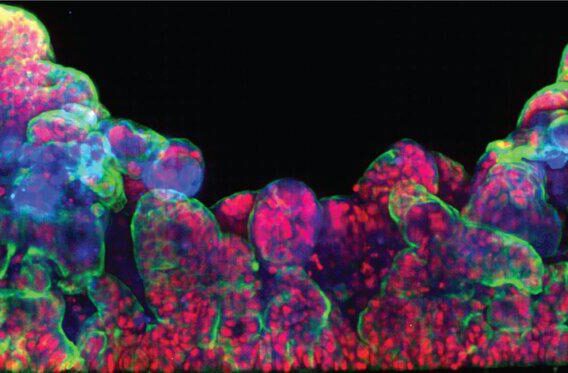Collaborative Programs to Refine Human Predictive Models of Inflammation in Lung and Gastrointestinal Diseases
CAMBRIDGE, Mass. – Emulate Inc. today announced an expanded research collaboration with Merck, known as MSD outside the United States and Canada, to deploy Emulate’s Organ-Chips across certain Merck discovery programs to improve models of human inflammatory diseases and better predict the potential human response of therapeutic candidates. The research will focus on using Emulate’s Small Airway Lung-Chip and Intestine-Chip to enable predictive modeling of inflammatory processes in the human lung and the gastrointestinal system.
The public disclosure of this expanded collaboration coincides with the publication in the peer reviewed journal Nature Methods of data showing new capabilities of the Lung-Chip technology to achieve accurate modeling of the human lung small airways. The collaborative work by Merck and Emulate researchers enabled new functionality for the Small Airway Lung-Chip to demonstrate the mechanism of action for therapeutic compounds acting on inflammatory disease states in the small airway, particularly in diseases such as asthma. This work provided greater mechanistic understanding of airway remodeling that occurs as a result of viral exacerbation in respiratory diseases and an improved model for predicting the response to therapeutic candidates.
This collaboration has already resulted in exciting new capabilities and insights for R&D for small airway diseases, and we look forward to further advancing the application of the Organ-Chips to improve therapeutic development.
— Geraldine A. Hamilton, Ph.D., President and Chief Scientific Officer of Emulate
“Working closely alongside the drug development teams at Merck offers an outstanding opportunity to create new benchmarks for the R&D process, with the ultimate goal of optimizing drug candidates earlier by testing them in Organ-Chips that mirror what happens in the patients whom the medicines are designed to treat and cure,” said Geraldine A. Hamilton, Ph.D., President and Chief Scientific Officer of Emulate. “This collaboration has already resulted in exciting new capabilities and insights for R&D for small airway diseases, and we look forward to further advancing the application of the Organ-Chips to improve therapeutic development”.
Under the terms of the collaboration agreement with Merck, Emulate will provide the use of its Organ-Chip technology in two specific organ systems, the Small Airway Lung-Chip and the Intestine-Chip, to advance drug discovery and development across certain Merck R&D programs. Emulate will retain the rights to any resulting discoveries related to the Organ-Chip technology. In addition, Merck has the option to extend the collaboration to include additional organs, disease models or drug programs. Other terms of the agreement are not disclosed.
The collaborative R&D program with Merck and Emulate is designed to use Organ-Chips to create true-to-life human models of how cells and tissues are remodeled in inflammatory processes and, consequently, how they alter the structure and function of human organs. Specifically, the collaboration is focused on two of the major organs, the lung and large intestine, in which prevalent disease states of inflammation cause a significant burden on human health. In the highly interactive collaboration between the two companies, Emulate researchers bring the state-of-the-art technology and capabilities of Organ-Chips and Merck researchers contribute extensive know-how in validating the results from the Lung-Chip and Intestine-Chip with tool compounds against current animal models and clinical data.
Organ-Chips for Emulating Human Biology
Based on the Organ-Chip technology, Emulate has created a new living Human Emulation System that provides a real-time window into the inner-workings of human biology, offering researchers ways to predict human response with greater precision and detail than today’s cell culture or animal-based testing. An Organ-Chip—such as the lung, liver, brain or kidney—contains tiny hollow channels lined with tens of thousands of living human cells and tissues, and is approximately the size of a USB memory stick. Each chip is a living, micro-engineered environment that recreates the natural physiology and mechanical forces that cells experience within the human body. The Human Emulation System can link multiple Organ-Chips together to model interactions between different organs and predict whole body or systemic-level responses.
About Emulate, Inc.
Emulate Inc. is a private company that creates living products for understanding how diseases, medicines, chemicals, and foods affect human health. Our Human Emulation System sets a new standard for recreating true-to-life human biology and is being used to advance product innovation, design, and safety across a range of applications including drug development, agriculture, cosmetics, chemical-based consumer products, and personalized health. Emulate continues to develop a wide range of Organ-Chips and disease models through collaborations with industry partners and internal R&D programs. Emulate is also working with clinical partners to produce Organ-Chips personalized with an individual patient’s stem cells for applications in precision medicine and personalized health. Our founding team pioneered the Organs-on-Chips technology at the Wyss Institute for Biologically Inspired Engineering at Harvard University. Emulate holds the worldwide exclusive license from Harvard University to a robust and broad intellectual property portfolio for the Organ-Chips technology and related systems.
For more information, visit emulatebio.com.
Media Contact:
Kathryn Morris
The Yates Network
Tel: 845-635-9828
kathryn@theyatesnetwork.com



